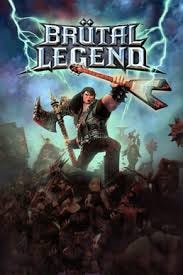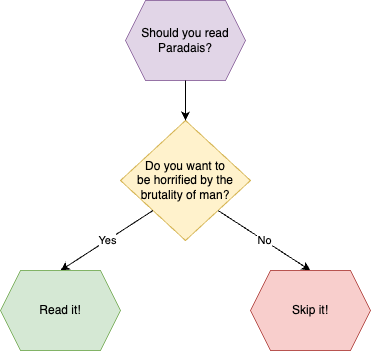Ring Shout really impressed me, so I went in search of another short, brutal, smart book. Paradais by Fernanda Melchor was recommended a million times in a million ways. It was long listed for the Booker Prize. How bad could it be?
Well…lets find out.
Quick-Take
Paradais by Fernanda Melchor
My rating: ★★☆☆☆ (2 / 5)
Length: 112 pp. • Tone: Relentless, graphic, bleak
In one line: Brutality without contrast leaves this social commentary novella feeling more like an endurance test than a revelation.
Spoiler Free Summary
Leopoldo “Polo” Garcia Chaparro is a high school drop out from a low income family, working in the gated, wealthy community of Paradise1 in Veracruz, Mexico. He’s miserable and only finds some fleeting solace with his companion Franco “Fatboy” Andrade (a resident of Paradise), whom Polo despises but who can supply Polo with alcohol regularly. Franco is obsessed with Senora Marian, a fellow Paradise resident, and fantasizes about her publicly and constantly. Polo is determined to leave Paradise by any means necessary…or is he?
If you’re enjoying this and think others would too, let em know! Here, I’ll make it easy for you:
What Worked
Paradais is unique in a few ways, there’s no denying that. It’s structure, prose2, and characters are not like many you’ll come across. The word I most often see associated with this novel in other reviews and marketing is “brutal”, and that feels apt. There’s not many redeeming qualities about any of the characters herein, least of all Polo or Fatboy. They’re all wretched creatures with a despicable view of humanity.3 If that sounds interesting to you, you’ll probably “enjoy” the cast here.
There’s also something in Paradais commenting on some social issues of the modern day. Most of these concern the issues surrounding toxic masculinity, touching on incels, the male loneliness epidemic, sexual violence, and the objectification of women. Outside of that, Paradais touches on income inequality, racism, and more. There’s arguably even a religious metaphor in that Polo needs to “sin” to find his way out of Paradise, ala Adam and Eve. It’s a lot to pack into 112 pages.
What Didn’t Work
If it sounds like I was struggling to find bright spots to highlight about Paradais, well, good intuition.
Let’s start with a concrete thing before moving on to more esoteric complaints. Paradais is written in a very unusual style4 in that it is almost completely run-on sentences5. Melchor puts sentences in there that stretch for several pages. I suppose some readers find it a bold stylistic choice that lends a certain tempo and feel to Polo’s internal voice. I also note that at the end of Paradais, during the climactic, violent scene we’ve been warned about since the opening pages, the prose shifts to short, intense sentences, which sets it apart from the rest of the novel, and that’s fun. However, I found 90% of the book difficult to parse and understand. That might be by design, as Polo is a troubled teenager who’s thoughts are similarly scrambled and forceful. I would have even enjoyed it in shorter bursts. Stretching over around 100 pages though was difficult to wade through. We invented grammar for a reason.
Remember I said a lot of folks called this book “brutal”? It is. What it lacks, however, is contrast.
Paradais is full, and I mean to the very brim, with extremely graphic and demeaning thoughts on women, descriptions of sexual violence, incest, gang violence/activity, and more. There’s no break, or at least not any that give you respite from all of that. Even in Gabriella Martin’s positive review of the book in the Harvard Review, 6she writes:
While the novel can be read in one sitting, it is not easy to take it all in at once, to stare (sexual) violence directly, intensely, helplessly in the face. The reader watches the events unfold solely through Polo’s point of view, as he attempts to rationalize his behavior and navigate his complicity in various events. We aren’t allowed to look away from the horror he sees. It’s a bold narrative move, and Melchor goes there, unafraid to analyze misogyny at its source and pull the reader with her—to look through the lens of, rather than at, toxic masculinity.
I agree with all of the above, I just don’t think it makes for good reading. Again…maybe that’s the point.
I also felt the book ended without a resolution. I’m at a loss on how to describe this without giving anything away, but as mentioned, there is a climactic, horrifying scene at the end of the novel. And then, nothing. We don’t see the fallout, the consequences or lack thereof, how this changed any of the characters, or what came of Paradise (the community) afterwards. Melchor leads us right up to the moment where the outside world will discover what transpired and then leaves us there. Sometimes I’m on board with that - a make your own ending, if you will - but this time it just left me feeling empty.
Paradais feels like a book that wants to be important. It feels…literary, in a way. There are a lot of bold choices made and its clear that Melchor had a vision of what she wanted to convey. For me, it just didn’t land. It felt like a collection of grotesqueries with an arty mask slapped on the front. Your mileage may vary.
Memorable Quotes (Warning: Graphic Language Ahead)
I didn’t save any quotes while reading, but I wanted to give you a flavor of what you’re getting into here. Graphic language ahead, so reader be warned. To note, this is not an endorsement of how much I liked the passage, I just think people should know what they’re signing up for:
<Polo is thinking to himself about Fatboy’s infatuation with Senora Marian> …as if a rotten swamp of a cunt justified all that effort, all that energy, the carnage that was to come, their lives devastated, everything gone for a second-rate fucking snatch: a grubby, slimy, murky hole.”
That’s…one of the tamer ones.7
Final Thoughts
It was interesting reading Paradais just after Ring Shout. They have more than a little in common, both being short, violent stories with a few monstrous characters and a social conscience. What I think Ring Shout did brilliantly, that Paradais did not, was to allow for some light to break through the clouds. Even in a short book like Paradais, you need to give people some breathing room. To put it metaphorically, you can’t see shadows if there’s no light to cast them.
5 Star / 1 Star
Flo gives 5 stars:
A violent book that perfectly captures that wrong, dangerous false hope that emptiness can be shaken by cruelty.
Some say this book is gratuitous. No, failure is this ugly.
That’s a lot of adjectives in two sentences.
Nanodayolo gives 1 star:
I'm all for unique and experimental writing styles, but what's up with the current trend of trying to make your book as hard to read as possible? If I had written a block of 100 pages with only a handful of paragraphs, my 5th grade teacher would have come at me. Rightfully so.
Once I got past my annoyance over the style, I realized the story itself isn't actually worth talking about.
Hell yeah. Fight the power, Nanodayolo.
Who Should Read This?
Rating
Look, Paradais isn’t the worst book I’ve ever read, by far. There is certainly skill on display, and the themes are relevant. Still, it just did not do it for me. Paradais, I bestow upon you 2/5 Mayan pyramids of Chichén Itzá:
Your turn: What’s a short novel that did find the sweet spot between darkness and levity? Leave a comment, I need a palate cleanser. If you know someone who is down with brutal lit, forward this along. As they say, misery loves company.
Until next time, keep the brutality to a minimum, yeah?
Mexican-born Polo has a hard time pronouncing Paradise (Par-ah-dee-say, in his voice), so his employers force him to call it Paradais, which makes him pronounce it as Paradise is said in English.
Hold that thought for the next section.
Senora Marian might be the exception, or maybe not? She’s a major focus of the book but oddly we don’t spend a lot of time with her, so it’s hard to tell.
Here’s where you can release that thought I had asked you to hold.
Grammar police will tell you that they are not technically run on sentences because they have punctuation separating the clauses and connecting parts of speech, but we all know what we’re talking about here. Your English teacher can’t hear you, it’s ok.
Note that her review offers more spoilers than I normally do, so if you are interested in reading this book, beware.
It should be noted that this book was written in Spanish and translated. I can’t read Spanish so I have to trust the translator’s faithful reconstruction, which by all accounts is very well done.









